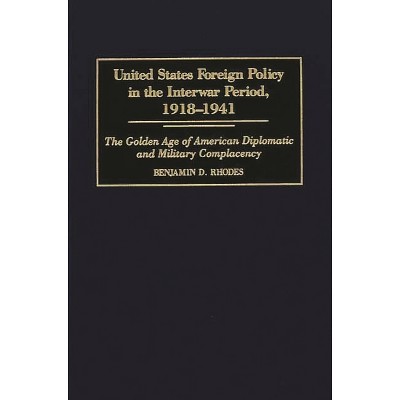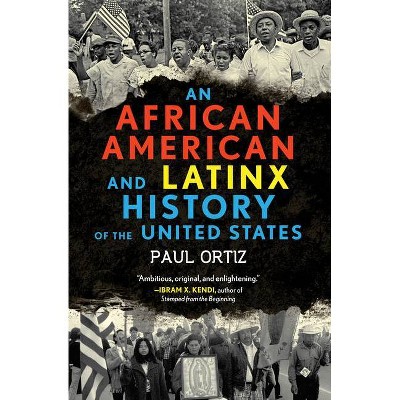The Evolution of Foreign Banking Institutions in the United States - (African Studies; 129) by Faramarz Damanpour (Hardcover)

About this item
Highlights
- Professor Damanpour provides a unique insight into international finance and banking.
- About the Author: FARAMARZ DAMANPOUR is Professor of Finance and Business Law in the College of Business at James Madison University.
- 265 Pages
- Business + Money Management, Banks & Banking
- Series Name: African Studies; 129
Description
About the Book
Professor Damanpour provides a unique insight into international finance and banking. Often books of this nature are either too theoretical or quantitative in nature. This book is a blend of both areas and thus becomes a useful tool . . . . I would recommend this book to anyone involved in international business irrespective of their specialized interest.
Brian A. Reynolds, Ph.D. Director, Center for International Business National College of Education
This groundbreaking study analyzes the rapid growth of foreign banking activity in the United States over the course of the past two decades and evaluates the potential impact of this development on United States banking institutions. The author brings together a substantial amount of information and data not previously available in one source to examine both the overall status of foreign banks in the United States and the structural components of international banks and lending institutions. Unlike those who see the influx of foreign banking in strictly negative terms, Damanpour demonstrates some positive aspects of the situation including the contribution of foreign banks to general improvement in the U.S. economy, increased competition in the banking industry, the provision of a flow of capital into U.S. balance of payments capital accounts, and the introduction of innovative techniques and pricing structures.
Damanpour begins by tracing the evolution of foreign banking and the financial goals of key players. He goes on to illustrate the institutional structure of international banking, detailing the types of foreign banking offices that have been established in this country. Subsequent chapters address the legal environment of foreign banking, international financial markets, U.S. international lending institutions, and such issues as the motivation behind international banking market structure and activities of foreign banks and major foreign banking concerns in the United States. The final chapters look at developments in international trade and banking and assess the impact of foreign banks and their future prospects. Written in a style accessible to both students and practitioners, this is an excellent text for courses in international finance, business, and political science programs as well as an important source of background information for members of the banking community concerned with developing appropriate responses to the increased foreign presence on the U.S. banking scene. Numerous tables enhance the text.
Book Synopsis
Professor Damanpour provides a unique insight into international finance and banking. Often books of this nature are either too theoretical or quantitative in nature. This book is a blend of both areas and thus becomes a useful tool . . . . I would recommend this book to anyone involved in international business irrespective of their specialized interest.
Brian A. Reynolds, Ph.D. Director, Center for International Business National College of Education
Review Quotes
"Professor Damanpour provides a unique insight into International Finance and Banking. Often books of this nature are either too theoretical or quantitative in nature. This book is a blend of both areas and thus becomes a useful tool for both students and faculty alike. . . . I would recommend this book to anyone involved in International Business irrespective of their specialized interest."-Brian A. Reynolds, Ph.D. Director, Center for International Business National College of Education
?As the relative US dominance of the world's financial resources has diminished, the domestic banking market has witnessed substantial and growing entry of foreign banking institutions. In this readable study Damanpour, a widely published student of finance, has assembled a substantial amount of information relating to the impact of foreign banking activity upon the domestic market. In addition he lays out in some considerable detail the similar and simultaneous overseas expansion of US banks. The author convincingly argues that foreign entry has benefited both banking and its customers by expanding competition and serving as a source of innovation in an industry where regulation has long acted to impede market-driven change. The theoretical explanation of the growth of international banking, the legal structure under which it operates, and the likely future of global banking are examined as well. Extensive bibliography; well-documented footnotes, very complete index. A suitable addition to undergraduate international finance collections.?-Choice
"As the relative US dominance of the world's financial resources has diminished, the domestic banking market has witnessed substantial and growing entry of foreign banking institutions. In this readable study Damanpour, a widely published student of finance, has assembled a substantial amount of information relating to the impact of foreign banking activity upon the domestic market. In addition he lays out in some considerable detail the similar and simultaneous overseas expansion of US banks. The author convincingly argues that foreign entry has benefited both banking and its customers by expanding competition and serving as a source of innovation in an industry where regulation has long acted to impede market-driven change. The theoretical explanation of the growth of international banking, the legal structure under which it operates, and the likely future of global banking are examined as well. Extensive bibliography; well-documented footnotes, very complete index. A suitable addition to undergraduate international finance collections."-Choice
About the Author
FARAMARZ DAMANPOUR is Professor of Finance and Business Law in the College of Business at James Madison University. He is the author of numerous articles in the area of banking and international finance and business. His recent articles have appeared in the Columbia Journal of World Business, the Journal of Retail Banking, Bankers Monthly, and the Asian Pacific Journal of Management. He is also the president and founder of the Association for Global Business, an educational organization devoted to fostering education and advancing professional standards in the fields of international business and related areas of global concern.










